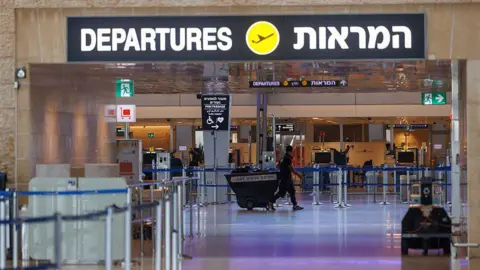In light of the escalating tensions in the Middle East, the United Kingdom has issued a stern advisory against all travel to Israel as airstrikes between Israel and Iran persist. This significant development was announced recently by the Foreign, Commonwealth, and Development Office (FCDO), which encompasses not only Israel but also the Occupied Palestinian Territories amid rising military activities from both nations.
The British advisory emerged in response to increased missile launches and military responses from both Israel and Iran, highlighting a precarious situation that has resulted in a fast-paced escalation of conflict. Currently, Israel’s airspace remains closed, which adds a layer of complexity to the travel situation in the region. The advisory specifically mentions the significant risks posed to individuals who may consider traveling to the area. It firmly states that the potential for the situation to rapidly deteriorate exists, underscoring the urgent need for caution among travelers.
The message from the FCDO also indicates that those currently in Israel or the Occupied Territories should adhere closely to instructions from local authorities to ensure their safety. Previously, the FCDO’s travel guidelines advised against “all travel to parts of Israel,” and this warning has now evolved to prohibit “all but essential travel” due to a declared state of emergency as of June 13. Foreign Secretary David Lammy took to social media platform X, emphasizing to British nationals in Israel that their safety is the government’s utmost concern.
Interestingly, while the UK government has taken a decisive stance towards travel to Israel, it has similarly advised against all travel to Iran. This precautionary measure adds another layer to the existing tensions and potential humanitarian hurdles for British citizens abroad. Among those impacted by these developments are individuals like James Eden, a 72-year-old grandfather from Newcastle-upon-Tyne, who found himself stranded in Jerusalem after embarking on a six-day Christian pilgrimage on June 9. He reported that his calls to the FCDO yielded limited support, with only alerts sent out to British nationals, rather than direct evacuation assistance.
Eden considered alternative routes to exit the region, including traveling to Egypt but felt that the FCDO would not be able to assist with his return to the UK from there either. A representative from the FCDO noted their continuous communication with Commonwealth citizens stuck in Israel and affirmed their readiness to support British nationals 24 hours a day, encouraging those affected to keep abreast of updates to their travel advice.
The regional conflict between Israel and Iran continues to intensify, as evidenced by the Israeli military’s recent strikes targeting Iranian military infrastructure, including alleged nuclear facilities. This prompted Iran to retaliate with airstrikes of its own, further raising the stakes between the two countries. Reports indicated that areas such as Bat Yam and Tamra were impacted by missiles from Iran, while Israel responded by claiming to have hit over 80 targets in Tehran overnight.
In parallel with these military movements, the UK government has also decided to send additional Royal Air Force jets to the Middle East as a precautionary step amid the ongoing instability. As a direct result of these violent and unpredictable developments, oil prices have seen a spike, revealing wider global ramifications should the conflict disrupt supply chains from the energy-rich region.
The UK’s travel advisory reflects a broader concern for the safety of its nationals and an acknowledgment of the escalating volatility in the region. It emphasizes the need for vigilance and preparedness for any rapid changes in the situation, which could significantly affect individuals traveling or residing in Israel and its surrounding territories.



